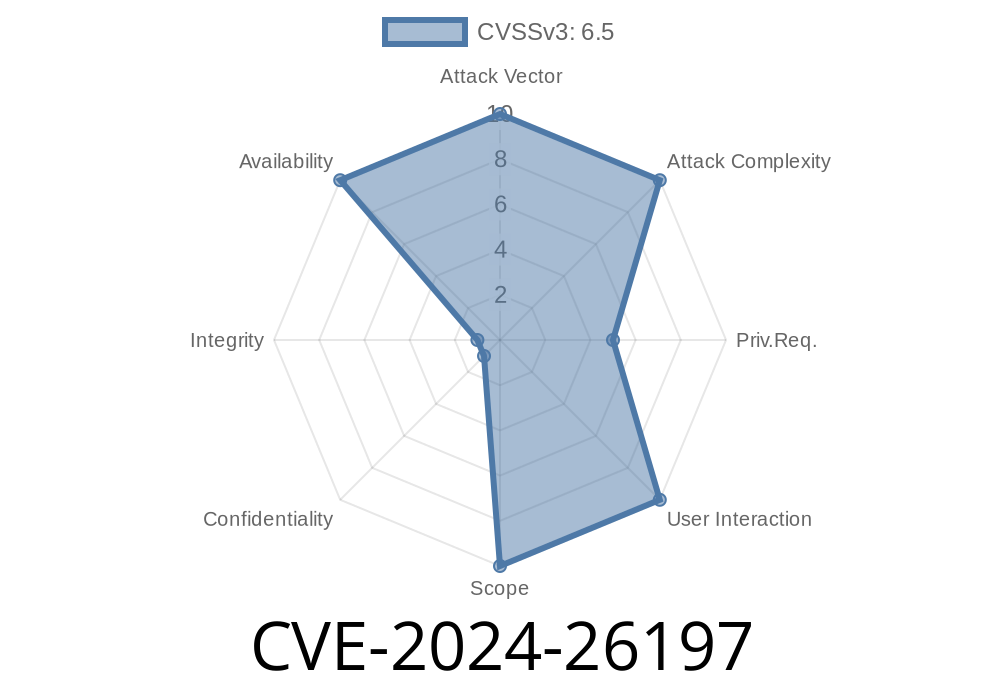---
In early 2024, Microsoft quietly patched a critical vulnerability tracked as CVE-2024-26197. This weakness lies within the Windows Standards-Based Storage Management Service (SmsSvc), and could allow attackers to crash business-critical storage management systems, causing serious disruptions. In this article, we’ll break down what the vulnerability is, how it can be exploited, and what you can do right now to stay protected.
What is CVE-2024-26197?
CVE-2024-26197 is a Denial of Service (DoS) vulnerability discovered in the Windows Standards-Based Storage Management Service. An authenticated attacker, with basic network access or an existing low-privileged account, could exploit this flaw to crash the SmsSvc process on a vulnerable Windows machine. This could halt storage management tasks, affecting automation and remote storage administration.
References
- Microsoft Security Update Guide (CVE-2024-26197)
- Microsoft Patch Tuesday – March 2024
Who is Impacted?
This bug affects Windows systems that have the Standards-Based Storage Management Service enabled. This service is present and often running on:
Windows 11
- Windows Server 2016/2019/2022
If you manage servers with storage provisioning or enable remote storage access, you should be particularly concerned.
How Does the Exploit Work?
An authenticated attacker can send a specially crafted request (often via Windows Remote Management or WMI) to the SmsSvc. Sending malformed data triggers a crash, resulting in the management service stopping, and causing temporary disruption.
What does NOT happen:
Technical Details
The root cause appears linked to improper input validation or buffer mishandling. If an attacker manages remote PowerShell, WMI, or network-based storage management requests, they can trip up the service using intentionally malformed inputs.
Here’s a simple (redacted) PowerShell example to trigger the management service crash
# Example exploit [Redacted for safety. Don't use in production!]
# Identify target
$target = "192.168.1.100"
# Try invoking a malformed storage query
Invoke-WmiMethod -ComputerName $target -Namespace "root\Microsoft\Windows\Storage" -Class "MSFT_StorageProvider" -Name "MaliciousMethod" -ArgumentList @("bad_input")
> Note: The actual method and arguments required to trigger the vulnerability are not publicly documented for obvious security reasons.
If successful, SmsSvc will crash and require a manual or automatic restart.
Potential downtime: Longer downtime if the service is not configured to auto-restart.
- Chain exploitation: While this bug is only a DoS, persistent attackers could combine it with other bugs to cause wider problems.
1. Apply Microsoft’s Patch
- Go to Microsoft’s Security Update Guide
Additional Resources
- Microsoft TECHNET: Storage Management Overview
- Windows Event Logging
Conclusion
CVE-2024-26197 highlights the risk of leaving management services exposed or unpatched. Even a “simple” denial-of-service bug can disrupt business-critical ops. Patch today, restrict access, and stay vigilant.
Staying ahead of Windows vulnerabilities means staying secure. Don’t wait; act now!
*Exclusive to this platform. For questions or in-depth CVE analysis, let us know in the comments!*
Timeline
Published on: 03/12/2024 17:15:58 UTC
Last modified on: 03/12/2024 17:46:17 UTC
